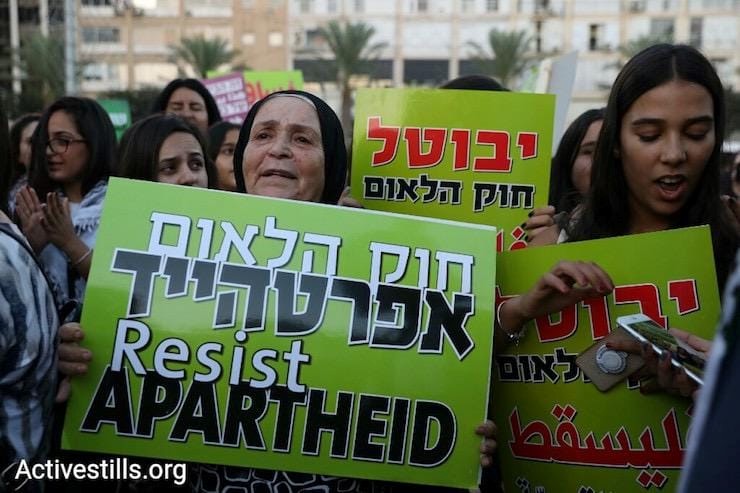Israel’s High Court of Justice (HCJ) rejected on Thursday, July 8, 26 separate petitions filed against the 2018 Basic Law: Israel as the Nation-State of the Jewish People, which enshrines a fundamentally racist ranking of citizenship based on ethnic affiliation, which was successfully promoted three years ago by the then ruling government of far-right Prime Minister Benjamin Netanyahu.
Towards its decision on Thursday, the court reviewed the law and ultimately ruled that “it does not violate the democratic character of Israel” and consequently declared its full constitutionality. This despite the fact that it prescribes that only Jews have the right to self-determination within the territory controlled by the State and establishes that Hebrew is its only official language, to the detriment of Arabic, which until the law’s enactment had, along with English, also been an official language. Ten of the 11 presiding justices favored denying the petitions, with Justice George Karra – the only Arab on the court’s bench – being the sole dissenting voice.

Tens of thousands, Arabs & Jews, protest the passage of the Nation-State Law in Tel Aviv, August 12, 2018. (Photo: Activestills)
Netanyahu dusted off the controversial bill – which had been shelved for years – in 2018, when he had a clear majority in the Knesset backing what has been called the most conservative, right-wing government in Israel’s history. Justice Minister Gideon Saar, who was then a member of Netanyahu’s Likud party, stressed that the Nation-State Law has the potential to define “the Jewish character of Israel.” After its approval in the Knesset, the law unleashed a wave of protests.
The petitioners included, among others, Jewish and Arab lawyers and academics, seven Bedouin army officers, the Joint List, Meretz, ACRI – Association for Civil Rights in Israel, the Adalah legal center, and the committee of local Arab authorities.
Joint List chair, MK Ayman Odeh (Hadash), did not hesitate to denounce the Court’s decision on Thursday as “racist and antidemocratic.” “The Jewish supremacy law received a stamp of approval today from the High Court,” he said. “But this is our homeland and no ruling will change that. We will continue to fight for equal rights for all citizens of the country, for the sake of true justice and real democracy.”
In a joint communique, the Communist Party of Israel and the Democratic Front for Peace and Equality (Hadash) said: “Democracy doesn’t mean equality for Jews alone. We will continue to fight until we reach full equality for all citizens, true justice and real democracy.”
Hadash MK Ofer Cassif (Joint List) railed at the High Court for rejecting all the petitions against the 2018 nation-state law, saying that “no court can legitimize a racist law” and appears to have suggested that lawmakers who backed it should be tried by the International Criminal Court (ICC): “The judgment against the Nation-State Law and of those who legislated it — [is] the tribunal of history. We hope that, on the way, they’ll pass through the Hague,” the headquarters of the ICC, Cassif tweeted. According to Hadash MK Aida Touma-Sliman (Joint List), “The High Court failed once again to prevent the harm caused by the inequality of Israel’s regime.”
Adalah – The Legal Center for Arab Minority Rights in Israel, which was one of the petitioners against the law, said: “The Supreme Court has today enshrined Jewish supremacy and racial segregation as founding principles of the Israeli regime.” The ruling “finally proves that the High Court does not protect Palestinians from some of the most racist legislation in the world since World War II and the downfall of the apartheid regime in South Africa.” Attorney Dan Yakir of ACRI, which was also among the petitioners in the case, said that Israel’s “Nation-State Law was legislated with the direct aim of hurting the Arab minority in Israel” and to make them second-class citizens.
Related: Posts on Nation State Law


